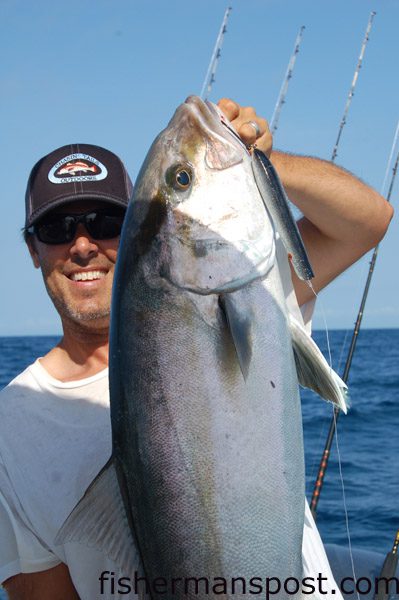Tidelines – July 10, 2014

Gary Hurley holds up one of the amberjacks that crashed a topwater popper over some high relief structure about 10 miles out of Bogue Inlet. He was fishing with Capt. Chesson O’Briant of CXC Fishing Charters out of Emerald Isle.
Fishing days, even when you’re the owner of a fishing publication, in my opinion are a precious commodity, especially offshore days, so when Tropical Storm Arthur threatened to take away a scheduled blue water fishing trip, I was looking to the captain to create a Plan B.
Capt. Chesson O’Briant, of CXC Charters out of Emerald Isle, had been reviewing weather and wind and seas for a couple of days prior to our Wednesday fishing trip, and ultimately the reasoning on Tuesday late afternoon was that it would be best not to head out 60 miles when a “known and documented danger” was approaching our direction from the southeast.
Chesson has been trying to get Fisherman’s Post in the blue water for a while now, and I think his first instinct was to reschedule our blue water trip. However, I was already green-lighted by wife and work to be offshore all day, so my instinct was for making something, anything, happen.
We ultimately decided that instead of 60 miles out it would be a better decision to target some areas around 10 miles offshore where we could find schools of amberjacks and then get them crashing on topwater poppers. The kings may cooperate, too, but the amberjacks would be our true target. I had just enjoyed some strong topwater redfish action the week before (see last issue’s Tidelines), so the word “topwater” was all I needed to confirm plans to meet Chesson at the new Emerald Isle Wildlife boat ramp at 6:15 am.
Yes, the ride out was a little bumpy, confirming that our decision to stay inside was the correct one, but the ride could have been a lot more bumpy (and wet) if not for Chesson’s 2901 Century center console that knocked down the 4’ seas coming at 5-6 seconds.
Chesson, like other captains along North Carolina’s southern coast, has discovered the power of the amberjack to help make a charter trip. The kings weren’t biting on some initial trolling (somewhat surprisingly, as we both thought fish would be chewing in advance of a Tropical Storm), so it was good news that our plan was for amberjacks (reliable and dependable) on topwaters (not as reliable and dependable).
A scientist at heart, Chesson is systematic in his approach to producing a topwater amberjack bite. We pulled up to the first piece of high relief structure, sent a live menhaden down to see if anyone was home, and soon the rod was doubled over with an amberjack trying to horse the bait back down to the safety of the bottom.
Yes, the fish were ready to play. The excitement of one of their own being hooked woke the other fish up, and soon we had 10-15 amberjacks just below the water’s surface.
A bait net of live menhaden offerings went out, and the bait rod was quickly abandoned for the topwater rod. For amberjacks, Chesson recommends keeping the popper moving (no pauses between pops) and creating a lot of noise. Following instructions, I brought the modified big plug (Chesson had removed both treble hooks and put a single 8/0 hook on the back) to the boat, trying to keep a steady retrieve while moving a lot of water with each pull.
The first couple of casts earned modest attention, with fish following the plug for short spurts back to the boat, but no amberjack truly committed. Then on about the fourth cast came the beauty of the offshore topwater bite.
Chesson and I both enjoyed the visual of the amberjack coming up on the bait, following it for a few yards, and then opening its mouth and crashing the plug. The line came taught, and I was left with the impressive power of a hooked amberjack.
And the rest of the day followed a similar pattern: trolling brought us little more than false albacore up top and Atlantic sharpnoses on the downrigger, but the amberjacks were at every location Chesson predicted they would be. We repeatedly hooked a couple of amberjacks on live menhaden, scattered a few live menhaden off the back of the boat, and then reached for the topwater poppers.
Capt. Chesson O’Briant’s CXC Fishing Charters can serve up as many amberjacks as you wish, but he also targets all things nearshore (such as spanish and flounder) and offshore (including kings and mahi and grouper), and he also loves a reason to head to the blue water.
You can give him a call at (919) 215-1950 to discuss Plan A or B, or visit him online at www.cxcfishing.com.
